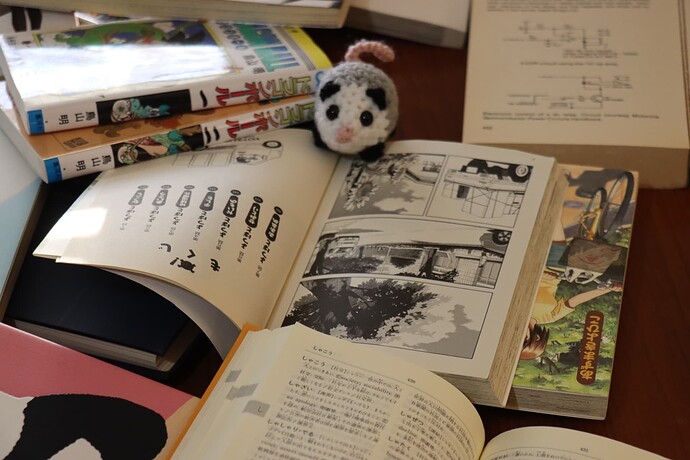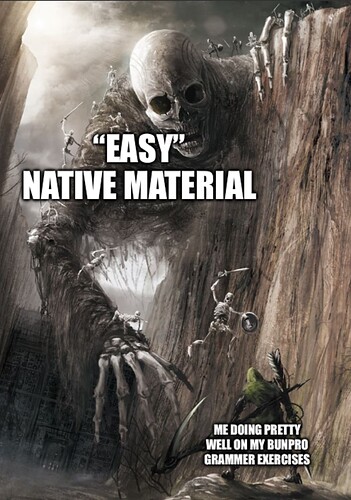Just dropping in to say I did my daily 5 pages( and then a few more because I couldn’t resist ).
The way I understand it, small っ is often used at the end of gasps and other non-word spoken sounds (like “uh”, “wow”, “huh” and so on). It’s not really pronounced.
(Although I might be wrong since I’m still learning, too)
Better late then never (oops) I guess  Thank you so much for setting this up!
Thank you so much for setting this up!
Sorry everyone I’ve been very busy with work! Hopefully it slows down at some point and I get a chance to catch up. But in exchange I took a picture of what everyone here looks like while they read yotsuba (real)
That’s what we look like, notice how we are way cooler than the more advance classes.
“They don’t call me ジャンボ for nothin”
Apologies if someone asked already and I missed it, but what is the breakdown of 「あいつだめだわ」?
あいつ (彼奴, that guy; derogatory) [は] + だめ (no good, useless; a word with lots of uses) + だ + わ (particle that indicates emphasis).
ヤンダを会うのを楽しみにするんだよ。

 優しい言葉 助くて ありがとう!頑張りましょう!!
優しい言葉 助くて ありがとう!頑張りましょう!!
Whatever this possom is studying in the top right corner seems much scarier than anything Japanese could throw at us 
Todays reading
I realized I might’ve gotten a bit ahead of the reading pace, so I stopped at pg. 36 today
For what made me go :? today, we see another instance of ちゃダメ which took a second to recall
I wasn’t familiar with いいか as an expression to get someone’s attention, but once I figured that out it made it pretty clear the text on pg. 36 was よつば remembering advice from her dad.
The なんでだと思う?gave me a good laugh as well
 , I thought just the same. こえー, こえー, 確かに怖すぎだよね!
, I thought just the same. こえー, こえー, 確かに怖すぎだよね!
「ちゃダメ」と「呼ぶ」について
It took me a moment to realise that she is remembering that her dad said to her “知らない人について行ってはダメだぞ”, “you must not go with strangers”.
Also, I think that 呼ぶ here is used as “if someone names your father (as if they knew him)”, as it wouldn’t make sense that they actually were calling トーちゃん if they might be 悪い人.
One question, よつば barely “uses” 漢字 when she speaks? It looks that way, I guess to stress the fact that she is a strange little thing?
Blockquote
One question, よつば barely “uses” 漢字 when she speaks? It looks that way, I guess to stress the fact that she is a strange little thing?
I think it’s more to show she’s a small kid, but correct me if I’m wrong.
Basically. It is very common in books and manga that when small kids or animals speak, there is a lack of kanji. This is usually to emphasize that they are just saying the words, but are not old enough/smart enough to truly understand the meaning yet.
The way I understand this part is “Even if they say that your dad is calling you” - like when your dad wants to see you and they are there to bring you to him.
Which would be exactly what is happening in the story.
Indeed, it makes more sense and is in line with the verb meaning. I didn’t pay attention to 言われても. Thank you!
Yotsuba is a quite hard; on Learn Natively it’s level 17, and 20 already is considered N3. And it’s one of the most popular titles on the site, so the difficulty level is pretty accurate. I don’t know exactly why it’s recommended to total begginers to be honest, it has good points but I don’t know if it would be my first recomendation.
@craze1x @Gacee happy to know I’m not the only one reading ahead unconsciously!
I have been thinking we should increase the pace a tiny bit. 5 pages for other types of books, like novels, can be pretty brutal, but for manga, it’s quite laid back. With 8 pages we can end the manga at the end of the month (I don’t know if that’s important for the book club or not), I think it wouldn’t be too much. Should we organize a poll of something?
Heya! I tried working this one out myself, as I like to understand how individual parts work (my brain has never been good at hanging onto whole phrases if I don’t know the breakdown).
Here’s my best guess, perhaps someone can correct me if I’m wrong:
どこって – the って here is possibly being used as the casual quotation marker. So, “‘Where?’”
それは – that (topic marker), being used to refer back to “where”
おまえ – literally “you.” As Asher mentioned above, this is a super truncated “you know that (already).” I can’t help but feel like this has to be super casual and also a hard lean into the “you can figure out the rest with context, so why bother saying it?” aspect of Japanese.
Thank you for clarifying the meaning behind it!
I think the current pace is good, reading 5 pages and keeping up with everyone’s valuable insights in the forum on top of my normal reviews and life in general. I did also read ahead today, but will just do more reviews tomorrow.



